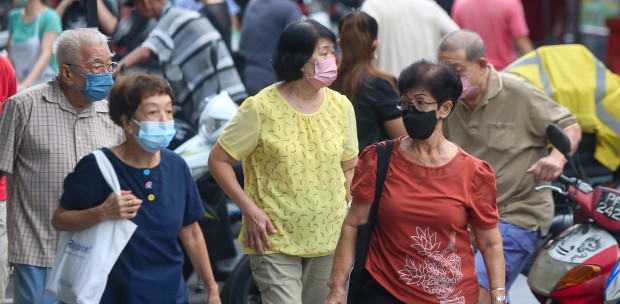COVID-19 cases are reported to be on the rise again and waning immunity and the emergence of new variants are likely factors.
Singapore is grappling with a sudden surge in cases, with 25,900 cases reported in the period of May 5-11, compared to 13,700 the previous week.
In Malaysia, as of June 1, data from the Ministry of Health indicates 9,398 active cases.
The new Covid-19 variants, collectively nicknamed FLiRT, are the latest to be identified in the ongoing evolution of the SARS-CoV-2 virus.
These variants are sublineages of the JN.1 variant, which itself descends from the BA.2.86 variant of the Omicron lineage, explains Monash University Malaysia Associate Professor (molecular virology) Dr Vinod RMT Balasubramaniam.
There is no reason to panic with these new variants, but vigilance is very important, he adds.
WANING IMMUNITY
While there is no indication that the circulating variants are more transmissible or cause more severe disease compared to previous variants, immunity in the population has likely waned over time especially for those who did not get their boosters.
"The FLiRT variants include specific mutations that help the virus evade antibodies while improving its ability to bind to human cells."
Vinod adds that one of the prominent FLiRT variants, KP.2, accounted for about 25 per cent of new Covid-19 cases in the United States in late April this year.
These variants are being closely monitored in various regions, including the UK and the US to understand their spread and impact.
In Singapore, the KP.1 and KP.2 variants account for more than two-thirds of cases currently, he explains.
"The symptoms associated with FLiRT variants are similar to those of previous Omicron variants, primarily causing mild to moderate disease. Like JN.1 and previous Omicron variants, it may take five or more days before a person starts to develop symptoms after exposure." Senior citizens are vulnerable to severe illness due to factors such as age-related physiological changes, decreased immune function and the presence of comorbidities.

Research indicates that adults aged 60 and older, especially those with pre-existing medical conditions like heart disease, lung disease, diabetes or cancer, are more likely to experience severe and potentially fatal Covid-19 infections compared to other age groups.
Vinod says people who are 65 years and older or immunocompromised and pregnant women are the most vulnerable.
Current Covid-19 vaccines, especially those based on the XBB.1.5 variant, still offer protection against severe outcomes and hospitalisation. However, the precise effectiveness against the newest FLiRT variants is still under study.
Vinod explains that vaccines still provide good protection against Covid-19-related hospitalisation and death, but two preliminary studies (one from Japan and another from researchers in China), suggest the FLiRT variants may be better at dodging immune protection from vaccines than the JN.1 variant.
Health officials continue to recommend vaccination, especially for high-risk groups. Measures such as masking in crowded indoor spaces and testing when symptomatic remain important.
COVID-19 MUTATIONS
One of the reasons the Covid-19 virus keeps mutating is its high rate of replication combined with a lack of proofreading mechanisms, explains Vinod.
Unlike human cells, which have sophisticated mechanisms to correct errors during DNA replication, RNA viruses like SARS-CoV-2 lack these proofreading mechanisms, making them prone to mutations.
The mutation rate of the virus can vary over time and in different populations. Some mutations may confer advantages to the virus, such as increased transmissibility, evasion of the immune system, or resistance to treatments.
These advantageous mutations are more likely to persist and become dominant in the population.
Vinod stresses that it's important to monitor these mutations closely to understand their impact on the virus' behaviour, transmission and the effectiveness of vaccines and treatments.
Boost your immune system with healthy supplements using iHerb promo code





